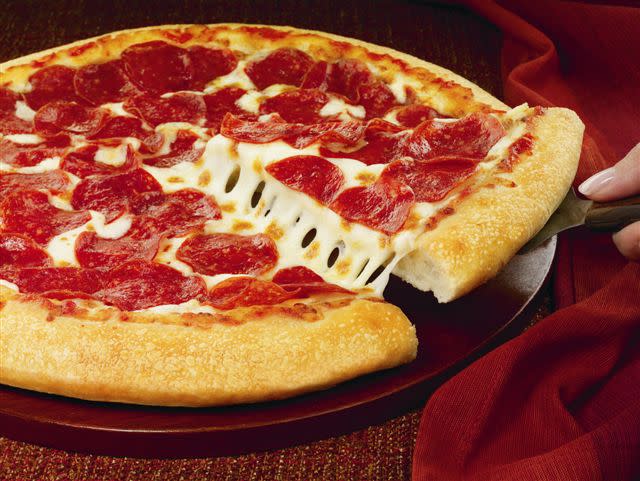The next Chipotle? It may be Pizza Hut

KFC and Taco Bell, two of the three main units of Yum Brands (YUM), have stepped out of their fast-food comfort zone to try and gain a foothold in the rapidly expanding fast-casual restaurant space. The third one hasn't. That's Plano, Texas-based Pizza Hut, the world's largest pizza chain, with almost 15,000 locations across the globe.
There's certainly no guarantee it will, but it wouldn't be a shock if it did expand into this realm, because pizza has its own developing fast-casual set of "craft" pizzerias. It's one of the buzzy restaurant trends being built around customization and less-processed ingredients, and large names are starting brands and investing in artisan pizza. Notably, Pizza Inn (PZZI) owns the expanding Pie Five chain, while Buffalo Wild Wings (BWLD) has acquired a stake in California-based PizzaRev, and Chipotle (CMG) has financially backed Colorado's Pizzeria Locale.
Though it's speculative, Darren Tristano, executive vice president at food-industry research group Technomic, sees merit in the idea. Although existing stores will continue to benefit from the convenience pizza delivery services provide for families and large gatherings at home, the fast-casual influence is having a noticeable impact on the group, he says.
"When it comes to lunch, and when it comes to dinner, this whole fast-casual pizza is taking a number of cities by storm," he says. "And Pizza Hut really needs to be aware of it, invest in it and potentially evolve to it."
Theoretically, it could do this a few ways: make changes to existing locations, open an entirely new restaurant with a new name or buy an existing operator. The first of those, altering current stores toward artisan-style pizza, quickly and on any scale, is extremely difficult to fathom. The second notion would involve Pizza Hut developing its own brand, as KFC has done with KFC eleven, Super Chix and Banh Shop, and as Taco Bell did with U.S. Taco Co. However, an even better way might be the third one -- to invest in a promising chain that's already building out and demonstrating success, Tristano says.
New days
PMQ Pizza Magazine has published industry data estimating the size of the U.S. pizza market at $37.3 billion in sales and more than 71,000 restaurants. Based on those numbers, Pizza Hut is today about 15% of the sales total and 11% of the stores. But last year, its domestic same-store sales were down 2%, while total sales, at $5.7 billion, were unchanged from 2012. Per-store sales fell 2.5% to $861,000. It's not panic time, but there's no victory in waiting for panic time. It's certainly still early enough on the fast-casual pizza timeline for Pizza Hut to put down roots.
It also would be a positive at a time when the brand is coping with some degree of stress overseas. Pizza Hut parent Yum has for years invested heavily abroad, particularly in China, but a series of negative news stories in the past couple of years, including a recent supply-chain investigation, has dented KFC and Pizza Hut sales in the world's second-biggest economy. Further adoption of fast casual could provide a small amount of insurance -- and a potentially long road of sales -- against further such drags.
The downside of pizza's popularity in the United States means stores aren't hard to find and competition is tremendous. With a fast-casual pizzeria, even if Pizza Hut's main-store share ebbs, it would be picking up uniqueness, important for today's "tired of the same" customer, as well as new revenue. Craft stores are attempting to capitalize on perceived consumer boredom by going beyond everyday toppings such as pepperoni, offering various crust flavors, multiple sauces, choice of cheeses and make-as-you-go lines, doing perhaps for pizza what Chipotle did for burritos.
And they're getting it right, in Tristano's view. "This whole assembly, fast-casual model is one that is here to stay," he says. "It's one that consumers want, and it's certainly poised for growth."
Pizza Hut and its largest competitors do regularly offer new creations and limited-time specials. These range from the Blake Shelton-backed barbecue-sauce pizzas and lower-calorie trials at Pizza Hut itself, to Domino's (DPZ) Tuscan Salami & Roasted Veggie and Papa John's (PZZA) Spinach Alfredo. However, these are adjuncts, a nod to fast casual's creativity, not a full commitment to a dedicated craft brand.
Past and future
Whether they sell burgers, burritos or pizzas, many fast-casual names are seeing strong sales and traffic, even though they tend to charge higher prices than fast-food competitors. Industry observers believe they'll keep their momentum, considering they're still small and making considerable effort to stand out. Technomic puts the fast-casual restaurants at about $35 billion in sales for 2013, or around 5% of what the National Restaurant Association says is now a $683 billion industry.
Here, influence exceeds size. These stores regularly promise better-for-you ingredients, concern about the environment and other themes viewed as resonating with the important millennial demographic, as well as eaters who've forsaken McDonald's (MCD).
Still, this fast-casual approach would require savvy at Pizza Hut. A key consideration here is the franchisees, who ran 94% of the 7,846 U.S. Pizza Huts last year. They'd have to be managed carefully, since they reasonably would not view competition from inside their own house as helpful to their operations. It could be dealt with, though, perhaps with the ability to take direct part in the new brand, maybe even with a conversion option, Tristano says. Pizza Hut, in business since 1958, would need to remain loyal to its past, while establishing a new future path. That won't be easy.
"It's not within their nature to be a fast-casual restaurant," Tristano says, adding that Pizza Hut has been a story of full-service restaurants and limited-service delivery. "They could potentially be their own worst enemy and roadblock because of their history, and their nature, and their brand and who they are."
